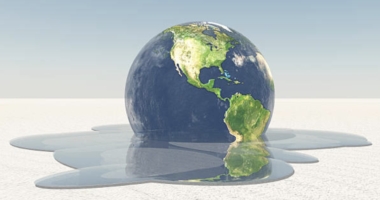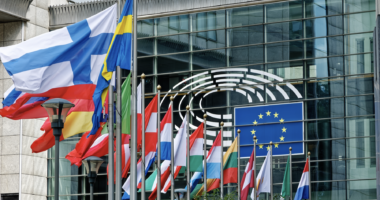Climate, Health and Equity Brief
Athletes feel the heat, and tipping points inch closer
August 4, 2024

The Climate, Health & Equity Brief is GMMB’s take on the latest news on the current impacts of climate change. If you haven’t subscribed yet, you can do so by clicking here.
Hot Topic: Olympics, present and future. Soaring temperatures blanketing Paris during the 2024 Olympics provide the latest example of climate change’s impact. Scientists say an extreme heat dome scorching North Africa and various Mediterranean countries this month, including France, would have been impossible without human-caused climate change.
With fossil fuels reported to have increased the heat dome’s effects in the Mediterranean by 2.5 °C to 3.3 °C, Olympians and spectators alike have been socked by high temperatures. Many Olympians have had to import air conditioners and wear ice vests to mitigate heat risks and safely participate in the Games.
After 1 in 100 athletes suffered heat-related illness at the Tokyo Olympics, the International Olympic Committee (IOC) created a strategic roadmap to boost sustainability and minimize carbon emissions at future Games. The plan included using existing or temporary venues, building new venues with recyclables and solar power, and using renewable energy and geothermal cooling systems to enhance energy efficiency.
Despite these changes, critics still point to the enormous environmental impact of such a large-scale event and the resources needed to make the Olympics possible. Paris, for example, spent $1.5 billion to improve the water quality in the Seine for the men’s triathlon, but heavy rainfall continued to push wastewater into the river. The IOC had to postpone the triathlon for several days until the water finally tested safe enough for swimming.
Scientists agree that the future of both the Summer and Winter Olympics is at stake in our changing climate. The IOC has already delayed its selection of a host for the 2030 Winter Olympics, with the climate feasibility of several potential locations in question.
An Axios analysis of CarbonPlan data found that by 2050, 60% of potential Summer Olympics locations will experience temperatures above 82°F, the recommended threshold for canceling continuous outdoor activity to avoid heat illness. And a climate study from The Lancet projected that by 2085, only eight cities outside of Western Europe would be cool enough to host the Summer Olympics—with the only potential U.S. venue being San Francisco.
Human Health
Athletes are facing unprecedented heat at this year’s Olympic Games, requiring them to adapt their training methods to include heat acclimation, hydration strategies, and cooling techniques. (BBC)
Three months after the United Arab Emirates experienced its heaviest rainfall ever, cases of dengue have surged in the area, with the World Health Organization blaming climate change and flooding for the disease’s tenfold surge over the last generation. (AP News)
As eco-anxiety rises, therapists are increasingly finding that traditional cognitive behavioral therapy is falling short, requiring new approaches to address the rational fears of an escalating environmental crisis. (Inside Climate News)
A new UN report reveals that one out of 11 people went hungry last year, with climate change and conflict exacerbating global food insecurity due to food production declines, supply chain disruptions and the spread of disease, setting the fight to eradicate hunger back by an estimated 15 years. (Grist)
Planetary Health
Last week marked the four hottest days ever recorded in human history, the culmination of more than a year that Earth’s average temperature has consistently—if temporarily—exceeded 1.5°C above preindustrial levels. (The Washington Post)
In a new study, scientists warn that exceeding the Paris Agreement limit of 1.5°C (2.7°F) will trigger devastating climate tipping points, including a rapid shutdown of ocean circulation and melting of the Greenland and Antarctic ice sheets, but swift emission reductions this decade could mitigate the dangers. (Axios, Phys.org)
Earth is in its 16th straight month of record-shattering ocean warmth, which NOAA warns can lead to ecological disruption, coral bleaching, sea-level rise, loss of marine life and hyperactive hurricanes and contribute to land-based extreme temperatures. (Axios)
Wildfires are tearing through Western North America, with the fifth-largest fire in California’s history contributing to a 2816% increase in state fire activity compared to 2023, fires in Oregon charring over 1 million acres in under a month, and a third of Jasper, Canada destroyed by the largest fire in the area in over 100 years. (CBS News, The Guardian)
Equity
In its largest-ever investment in environmental justice, the EPA announced $2 billion in grants to 150 community-driven projects to clean up pollution and develop clean energy in disadvantaged and minority communities. (AP News)
Carbon credit sales have dropped from $2.1 billion in 2021 to $723 million in 2023 as controversy has increased over their effectiveness and viability, making it challenging for active projects in developing countries to sell their credits and raise the money to continue conservation programs. (The Wall Street Journal)
Politics & Economy
Israel’s war on Gaza upended a landmark climate adaptation deal in the Middle East, which was set to send billions of gallons of water each year from Israel to Jordan in exchange for electricity from a new solar farm. (Grist)
When President Biden leaves office in January 2025, he will have cemented his climate legacy by passing the most significant climate bill in American history, allocating historic levels of funding to climate projects, issuing major emission regulations, and rejoining the Paris Climate Agreement. (Axios)
Companies are reimagining their operations to adapt to the intensifying impacts of climate change by implementing innovative cooling systems, redesigning supply chains for resilience, and embracing transformative measures to combat rising temperatures. (The Washington Post)
New data from insurance agency Policygenius revealed that between May 2022 and May 2023, home insurance premiums rose by a staggering 21%, with experts pointing to increasing extreme weather events as a culprit for rising costs. (CNBC)
The latest aerial measurements from the MethaneAir project indicate that U.S. oil and gas basins emit around four times more methane than estimated by the EPA and eight times greater than the oil and gas industry’s target. (Reuters, Environmental Defense Fund)
The U.S. has spent billions of dollars since the 1960s moving sand to rebuild popular tourist beaches, but experts say this system of “nourishing” beaches is increasingly unsustainable as rising seas, storm surges and king tides erode coastlines faster than ever before. (POLITICO)
Action
The Biden-Harris Administration announced a plan to phase out the purchase of single-use plastics by the federal government—the single largest buyer of consumer goods in the world—by 2035. (The New York Times)
The EPA announced $4.3 billion in climate pollution reduction grants for 25 new projects proposed by states, tribes, local governments and territories that could reduce greenhouse gas emissions by as much as 971 million metric tons by 2050. (The New York Times)
South Africa—a top 15 greenhouse gas emitter—enacted new climate change laws that set emission caps for government sectors and require each municipality to develop a climate adaptation plan to help the country meet its emission reduction commitments. (Reuters)
NOAA and United Airlines are partnering to measure greenhouse gases and pollutants in the sky during domestic flights by attaching data-collection equipment to a Boeing 737, which will also help improve the accuracy of U.S. weather forecasts. (AccuWeather)
Life as We Know It
Heat increasingly poses a significant threat to athletes and spectators, underscoring the urgent need for climate adaptation strategies for future summer Olympic games. (Axios)
The alternative meat industry—facing cultural resistance, declining sales and a bevy of headlines denoting it as a passing fad—may need significant public sector investment to overcome its challenges, according to a new report. (Grist)
Florida, which produces 17% of the world’s tangy fruit, had its smallest harvest in almost a century during the 2022-2023 season, putting the $7 billion industry at risk as crop-damaging pathogens spread and hurricanes continue to increase in a warming climate. (Grist)
The 50,000 animal welfare organizations in the U.S. are overwhelmed by the increase and severity of climate-related weather events, becoming strapped for resources and space to house animals. (National Geographic)
Kicker
Curious about how heat is impacting the health of your neighborhood? Enter your address into the CDC’s Heat and Health Tracker to find insights into heat exposure, related health outcomes, and heat protection tips for your local community.
Climate change crashed the Olympics. If the atmosphere wasn’t overloaded with emissions from burning fossil fuel, Paris would have been about 3°C [5.4°F] cooler and much safer for sport.”
– Friederike Otto, climate scientist, Imperial College London
The GMMB Climate, Health & Equity Brief would not be possible without the contributions of the larger GMMB team—Aaron Benavides, Stefana Hendronetto, Nikki Melamed, Sharde Olabanji and Marci Welford. Feedback on the Brief is welcome and encouraged and should be sent to [email protected].





